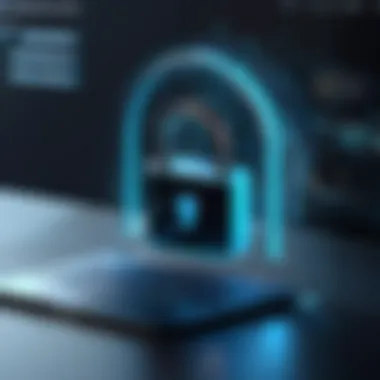Unblocking VPN: Free Download Guide for Windows 10


Intro
In today’s digital era, the importance of online security cannot be overstated. An increasing number of people use the internet for banking, shopping, and personal interactions. This dependency has, however, opened up avenues for various cyber threats. Navigating these threats effectively is paramount, especially for individuals vigilant about their online security and privacy. This article reviews essential concepts, tools, and practices necessary to unblock a VPN through free downloads for Windows 10.
Overview of Cyber Security Threats
The World Wide Web poses significant risks to personal and organizational systems alike. Cyber threats come in varied forms which can seriously jeopardize online safety. Understanding the nature of these risks is crucial for taking effective measures
- Types of Cyber Threats:
- Statistics on Cyber Attacks: According to recent studies, there has been a steep rise in the number of cyber attacks in recent years, with a significant percentage targeting individual users and small businesses.
- Real-life Examples of Security Breaches: High-profile incidents, such as the Equifax data breach, show that even established organizations face serious challenges in managing security. These breaches often result in extensive data loss and compromise of personal information.
- Malware: Malicious software designed to harm devices, steal data, or perform unauthorized tasks.
- Phishing: A technique used by cybercriminals to trick users into exposing personal information or clicking harmful links.
- Ransomware: This form of malware locks the user’s files and demands a ransom for their release.
Understanding these threats reinforces the value of measures like VPNs, which enhance online privacy and security.
Best Practices for Online Security
To safeguard against potential cyber threats, certain practices are recommended for users:
- Strong Password Creation: Use unique passwords that include a mix of letters, numbers, and symbols.- Consider using a password manager like LastPass or Bitwarden to generate and store complex passwords securely.
- Regular Software Updates: Ensure that applications and devices have the latest updates and patches to close any vulnerabilities. This is a crucial step in maintaining security.
- Two-Factor Authentication: Whenever possible, utilize 2FA for an added layer of protection which reduces the risk of unauthorized access even if login credentials are compromised.
Reviews of Security Tools
The right security tools significantly enhance online safety. Several valuable resources can ensure effective protection:
- Antivirus Software: Products like Avast, Bitdefender, and Norton are evaluated for their effectiveness in detecting and neutralizing viruses and threats. Each offers distinct features suited for varying needs.
- Firewall Protection: Firewalls serve as a first line of defense against unauthorized access. A comparison of built-in operating system firewalls versus third-party firewalls shows that the latter often offer enhanced configurability.
- Password Managers: Assessing various options reveals that tools like Dashlane and Keeper provide efficient functionalities that streamline password management.
Tips for Ensuring Online Privacy
Explicit measures taken to strengthen privacy are vital in today's interconnected world:
- VPNs for Secure Browsing: Employing VPNs like NordVPN or ExpressVPN can shield one’s activities on the internet, making it harder for third parties to spy on personal actions.
- Social Media Privacy Settings: Regularly review privacy settings on platforms such as Facebook and Twitter to manage who sees shared content.
- Protecting Personal Data: Always verify the security of websites before making transactions. Look for “https” in URLs, indicating that the user is in a secured browsing environment.
Educational Resources and Guides
Becoming informed and prepared is the best strategy against cyber threats:
- How-to Articles: Create awareness on implementing encryption tools, which can add another layer of security.
- Spotting Phishing Emails: Familiarize oneself with characteristics of phishing scams to avoid falling victim to said attacks.
- Cheat Sheets: Having a quick-reference guide at hand can significantly streamline efforts to enhance online security protective practices.
By understanding these different facets of cyber security and adhering to best practices, individuals can bolster their defenses. Unblocking a VPN not only improves privacy but also contributes to a safer online experience.
Foreword to VPNs and Their Importance
Virtual Private Networks (VPNs) are critical for maintaining security and privacy in today's digital world. This segment provides a gateway to understanding this technology and highlights its necessity in contemporary online interactions. With an increasing number of threats to personal and organizational information, awareness of VPNs cannot be overlooked. Conceived over two decades ago, VPN technology has evolved into a cornerstone for safe internet use. Understanding its role can empower users, providing insights into online risks and mitigation strategies.
Defining VPN Technology


VPN technology enables users to create secure connections to other networks via the Internet. It does so by encrypting the user's data, turning it into a code that can only be deciphered by intended users. This encryption shields data from unauthorized access, making online transactions safer. Moreover, VPNs mask the user's IP address, thereby enabling anonymous browsing. Users can connect to servers that may be located in various countries, allowing access to geographically restricted content. Additionally, VPN technology uses protocols such as OpenVPN and L2TP/IPsec to ensure data is secure.
The Role of VPNs in Online Security
The primary role of VPNs in enhancing online security is evident in their ability to safeguard sensitive data. Utilizing a VPN means that when connecting to public Wi-Fi networks, information remains protected from potential hackers and data sniffers. According to statistics, over half of data breaches occur in wireless environments. A reliable VPN can significantly reduce your chances of becoming a victim. Ultimately, VPNs enable a layer of protection that most individuals tend not to think about—the true power lies in being conscious of our digital footprints.
Understanding Online Privacy Challenges
Privacy challenges on the Internet are becoming more complex. With far-reaching surveillance from corporations and government bodies, users risk their personal data being exploited. Data collection practices by social media and websites often go unnoticed. Moreover, location tracking can unveil personal information, placing users at risk of identity theft and other threats. VPNs address these issues by protecting user anonymity while browsing. This not only benefits individuals but also strengthens overall internet security. However, understanding that not all VPNs are created equal is essential. Quality matters significantly, as free or unreliable services can introduce vulnerabilities rather than eliminate them.
Assessing the Need for VPNs on Windows
Evaluating the necessity of Virtual Private Networks (VPNs) on Windows 10 is vital. Given the current landscape of online threats and privacy concerns, understanding when to use a VPN becomes increasingly important. This section offers insights into potential hazards faced by Windows 10 users and outlines criteria for deciding when a VPN should be implemented.
Common Online Threats for Windows Users
Windows users often confront a range of online threats.
- Malware: With an extensive range of malware targeting Windows systems, users can unknowingly download harmful software from untrusted sites.
- Data Leakage: Windows 10 can be susceptible to data interception, whether browsing or transferring files.
- Public Wi-Fi Vulnerabilities: Using public Wi-Fi networks can expose users to unauthorized access, allowing attackers to intervene in users’ activities, particularly without VPN protection.
Additional factors include phishing schemes, aimed at stealing sensitive information like logins or financial details. As information and digital assets grow more invaluable, the significance of combatting these threats escalates.
When to Consider Using a VPN
The appropriate circumstances to engage a VPN include:
- Accessing geo-restricted content: Services like Netflix may limit availability based on location. A VPN allows users to bypass these barriers, accessing a larger catalog of multimedia.
- Enhanced security in public networks: VPNs provide encryption, securing connections on vulnerable networks. This step often becomes essential when accessing sensitive data.
- Upload or download without surveillance: Users write freely online without worrying about excessive tracking by websites or government entities by utilizing a VPN.
- Bypass censorship: Where legal systems impose website restrictions, a VPN's capacity is crucial for uninhibited access to valuable resources.
Taking these considerations into account enables users to discern precisely when a VPN could bolster both their security and browsing experience, justifying its inclusion in their routine digital toolkit.
A VPN can serve as a formidable tool for safeguarding your online interactions against prying eyes, embodying a proactive rather than reactive approach to online security.
Identifying Trusted VPN Providers
In the realm of online privacy and security, selecting a trustworthy VPN provider is a critical step. The rise in cyber threats and data breaches underlines the need for users to choose a VPN that not only offers protection but is also robust and reliable. A trustworthy VPN provider enhances security by providing secure connections, safeguarding personal information, and mitigating risks associated with public networks. With the multitude of options available, understanding the characteristics that ensure reliability becomes paramount.
Characteristics of a Reliable VPN
A reliable VPN provides several key features that align with the confidentiality and security needs of its users. The following elements are essential in identifying a trustworthy VPN:
- Strong Encryption: A good VPN uses advanced encryption standards such as AES-256. This level of encryption secures your data from being intercepted by malicious entities.
- No Logging Policy: Trustworthy providers do not keep logs of user activity. A strict no-log policy ensures that your data and online behavior remain anonymous, safeguarding your privacy.
- Kill Switch: This feature acts as a safeguard. It cuts off internet access if the VPN connection drops unexpectedly, maintaining your anonymity.
- User-Friendly Interface: Ease of use is important. A reliable VPN should offer a simple and intuitive interface suitable for both novice and experienced users.
- Multiplatform Support: Look for VPNs compatible with various devices and operating systems. This compatibility ensures seamless functionality across all devices you may use.
- Customer Support: Robust customer service options, including live chat and email, are crucial for resolving issues or answering questions promptly.
By focusing on these characteristics, users can make informed selections, enhancing their online security effectively.
Top Free VPN Options for Windows
When considering VPNs, particularly for Windows 10, users can choose from several impressive free options. While some free VPNs come with limitations, they often provide suitable alternatives for those seeking enhanced online security without financial commitment. Here are a few noteworthy providers:


- ProtonVPN: Known for high standards of privacy and security, ProtonVPN offers a free tier with no data cap. This qualitative service stands out in comparison to others.
- Windscribe: Windscribe allows users up to 10GB of data per month on its free plan. It offers strong encryption and a user-friendly platform, making it suitable for casual users.
- TunnelBear: This user-friendly VPN provides 500MB of free data per month. Its simplicity and ease of use appeal to those new to VPNs.
- Hide.me: Providing a limited but unrestricted free service, Hide.me is renowned for its commitment to transparency and user privacy.
Always remember, while free services are enticing, there may be trade-offs in terms of speed and availability compared to paid options.
Choosing a trusted VPN provider remains indispensable. Taking time to evaluate options leads to securing your online activities effectively. By following the guidelines above, users can confidently make decisions on which VPN will best align with their privacy needs.
Download Process for a VPN on Windows
The download process for a VPN on Windows 10 serves as a critical bridge connecting users to enhanced online security and privacy. This is where potential users identify options that closely fit their specific requirements. A correct download process not only brings software onto the system, but also ensures the right VPN is chosen at the outset, capitalizing on security, performance, and compatibility. Poorly managed downloads or untrusted sources can result in serious risks, such as malware or compromised data.
Choosing a reliable VPN from various options, especially free ones, can greatly improve users' online experience by navigating internet restrictions and providing privacy. Being informed behind this process allows Windows 10 users to enjoy secure internet access while being protected from the lurking threats of today’s online environment.
Finding a Free VPN Download
When searching for a free VPN download, it is vital to evaluate the vendors carefully. Various platforms and folks may tout free VPNs, yet not all are created equal. Legitimate services often provide limited options, featuring essential secure connections, making sure that users can maintain performance standards.
In discussing trusted download locations, the official websites of specific VPN services should always be prioritized. Well-known options include the likes of ProtonVPN or Windscribe, which offer free tiers without hidden costs unlike dubious download sites that host pirated or unsafe software. Consider genuine reviews from trustworthy outlets, such as Reddit discussions, about each VPN software prior to making commitments. Utilize major forums to gather insights regarding users’ experiences.
Navigating VPN Installation
After completing the download phase, the installation method begins. This step involves moving the newly downloaded file from your download directory to execution. Common file formats include .exe or .msi files specifically designed for Windows 10 users. Running the installation file will generally initiate a wizard that leads you through the necessary stages. Attention to any prompts appearing on the screen during this process is essential, as they can dictate how the VPN integrates with your system.
Your system may require specific information during configution, like preferences on automatic launch options or default connection methods. Be meticulous in adhering to the instruction sequence displayed by the software. Make sure you grant appropriate permissions for network access requests, enhancing overall functionality.
Common Installation Issues
Even the strongest VPNs can encounter installation hiccups. Identifying frequent problems can greatly help in troubleshooting without considerable delay. Issues may arise such as conflicts with existing software, interruptions from firewalls, or interrupted downloads.
Here are common issues to be aware of:
- Existing Conflicts: If multiple VPNs exist on the system, one must be removed prior to new encounters.
- Firewall Restrictions: Software might alert security measures set around the system, requiring additional housing to allow for unchecked access.
- Connectivity Problems: Slower internet speeds or dropped connections during download directly impact installation. Check speeds using a service like Speedtest.net if connection drops persist.
Employing proactive measures can minimize installation frustrations. Keeping your Windows 10 updated eliminates compatibility issues, while maintaining backups can save you from data loss in the event of errors.
"Ensuring reliable VPN installation safeguards your digital connection and fosters a secure online experience."
Configuring Your VPN for Optimal Use
Configuring a VPN correctly crucially impacts its performance and effectiveness. An improperly configured VPN can lead to issues that may hinder its primary purpose, which is protecting your privacy and ensuring secure online browsing. Optimization helps ensure that the VPN provides a genuine sense of security while providing a seamless internet experience.
When considering VPN configuration, users should focus not only on connecting to the VPN but also on the settings that influence speed, security, and compatibility with websites and applications. Taking these aspects into account can minimize disruptions during your online activities.
Essential Configuration Settings
The essential settings in a VPN software can either enhance or degrade its performance. Some configuration settings are vital for securing the network. Understanding these configurations is critical for ideal VPN functioning:
- Protocol Selection: Different VPN protocols exist like OpenVPN, L2TP/IPsec, and IKEv2. OpenVPN stands out for its balance of speed and security. It is vital to choose a protocol that suits your usage requirements.
- Kill Switch: This feature stops all internet access if the VPN connection drops, preventing IP leaks. Always enable the kill switch as a safeguard for your privateness.
- DNS Leak Protection: Ensuring that your DNS queries do not leak to your Internet Service Provider (ISP) enhances privacy. Opt for settings that offer DNS leak protection.
- Auto-Connect Features: Configuring the VPN to initiate automatically upon startup ensures that your online activities remain secure from the outset.
- Split Tunneling: This allows you to use the VPN for some applications while letting others bypass it. It aids in managing data consumption while using your VPN thoughtfully.


Once configured, these settings help create a robust shield against potential threats, allowing your internet usage to proceed without outside interference.
Testing Your VPN Connection
Testing is paramount to determine whether the VPN works as intended. Validation ensures no compromises on security:
- Check IP Address: After connecting, use sites like whatismyipaddress.com to check if the displayed IP address matches the VPN server location. It should not show your actual location.
- Run a DNS Leak Test: Access a DNS leak test website to confirm your DNS requests are routed through the VPN. If you notice any leaks, revisit the configuration settings.
- Assess Speeds: Measure the speed of your internet connection with and without the VPN. Noticeable drops may require configuration adjustments.
- Access Restricted Content: Test the ability to bypass restrictions on various websites or services known for geo-blocking. Misconfigurations can affect successful access.
By conducting these tests regularly, you can help maintain a secure and efficient VPN experience.
Ensuring Continuous VPN Functionality
Keeping your VPN functioning properly is crucial for maintaining online privacy and security. Without a reliable VPN connection, users can expose sensitive information or suffer reduced performance. This section outlines specific steps necessary to sustain VPN functionality and how to address common issues that may arise.
Update Your VPN Software Regularly
Regularly updating your VPN software ensures you benefit from the latest security patches and enhancements. Developers continuously work to improve their software, addressing vulnerabilities and optimizing performance. Here are some key considerations for keeping your VPN updated:
- Security Enhancements: Updates can fix bugs and security loopholes, shielding users from potential threats.
- Improved Features: Many updates add new capabilities, enhancing overall usability.
- Compatibility: As operating systems evolve, so must VPNs. An update keeps your software compatible with the latest technology.
To simplify this process, consider enabling automatic updates if the option is available. You may also check the provider's website or user dashboard periodically to see if new versions are released.
Recognizing Signs of VPN Slowdown
Understanding how to identify a slowdown in your VPN connection is vital. Slow performance can stem from various factors, including bandwidth, server load, or glitches.
Common Signs of Slow VPN Performance:
- Buffering Issues: Experiencing delays when streaming or loading content.
- Reduced Speed: Testing your internet speed may reveal a noticeable drop in performance.
- Frequent Disconnections: Regularly dropping the connection can be indicative of server issues.
What to Do:
- Switch Servers: Try connecting to a different server. Different times of the day can impact performance metrics as well.
- Contact Support: Reach out to your VPN's customer service for assistance and guidance.
Staying informed and performing regular checks on your VPN can significantly impact its effectiveness, allowing for smoother internet browsing experiences.
Maintaining consistent functionality enhances your overall VPN experience. Troubleshoot promptly to address any disruptions while keeping your application updated. This awareness not only improves security but also your overall internet satisfaction.
Finale and Future Insights
Recap of Key Points
In this guide, we have examined the essential aspects surrounding the use of VPNs, especially in the context of their function and necessity for users of Windows 10. VPN technology protects your online activity from voluntary monitoring and malicious entities. Most importantly, we addressed the significance of top quality and free VPN options available to users. Such VPNs empower individuals to reclaim their privacy while navigating the internet. They also provide alternative access to region-locked content that many find compelling.
We learned about the distinguishing characteristics of a reliable VPN, including data encryption capabilities, no-log policies, and user-friendly interfaces. Additionally, practical steps were illustrated regarding how to download and install VPN software effectively— showing that these processes, even when they seem daunting at first glance, can be navigated successfully with due diligence.
The Future of VPN Technology
As we look toward the future, VPN technology is poised for significant growth. There will be advancements which seek to streamline the user experience while maintaining important features aimed at bolstering security. Increasingly complex online threats require robust protection measures. Consequently, VPN providers are likely to innovate, leveraging better encryption methods and speed optimizations.
Furthermore, the public is slowly becoming more aware of privacy rights and the various means through which data can be compromised. This rise in awareness may drive demand for collective privacy solutions, resulting in widespread acceptance and incorporation of VPNs into everyday online activities. Governments and organizations are also under scrutiny, assisting in the recognition and importance of digital privacy through legislation and compliance.
In summary, regularly assessing the tools available for online security, along with their evolution, is crucial for users. As on the internet continues to change, an incremental but determined adoption of improved VPN solutions will likely lead the conversations about digital safety and privacy in the years to come.







